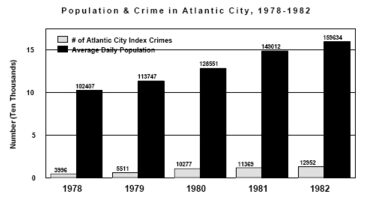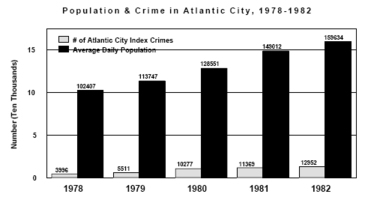Advocates and detractors of the gaming industry, public policy makers, researchers, and the public are among those who are interested in assessing the benefits and liabilities of gambling. One of the indicators of social costs is the effect of gambling on crime. Evaluating crime statistics involves investigating and making decisions about 1) the change in the population at risk, 2) changes in criminal opportunities, 3) changes in law enforcement resources & priorities, and 4) changes in the prevalence of crime elsewhere in the United States. For example, if a city increases their police personnel, it is likely that the incidence of detected crime also will increase.
A study of the effect of casino gambling on crime* in Atlantic City during the period 1978 to 1982 collected data on the crime “Index”. The crime “Index” includes: murder, forcible rape, robbery, aggravated assault, burglary, larceny, and motor vehicle theft. This study found that although crime increased during this five-year period, increases also were evident in the number of police employees, the average daily population, and serious crime elsewhere in the United States. When average daily population was controlled for, the correlation between the presence of casinos and crime dropped markedly from +.96 to -.34. According to this study, increases in Atlantic City crime during this period were best accounted for by the increase in population, not the increase in the number of casinos. Thus, while Atlantic City experienced an increase in the absolute number of crimes, it also experienced a decrease in the rate of crime given the increase in the average daily population of the city. In spite of methodological difficulties, further carefully crafted empirical research is necessary to explore this important yet complex area.
Source: Albanese, J.S. (1985). The effect of casino gambling on crime. Federal Probation: A Journal of Correctional Philosophy and Practice, 49, 39-44.
This public education project is funded, in part, by The Andrews Foundation and the Massachusetts Department of Public Health.
This fax may be copied without permission. Please cite The WAGER as the source.
For more information, contact the Massachusetts Council on Compulsive Gambling
190 High Street, Suite 6, Boston, MA 02110
gambling@aol.com (e-mail)
(617) – 426 – 4554 (voice)
(617) – 426 – 4555 (fax)





